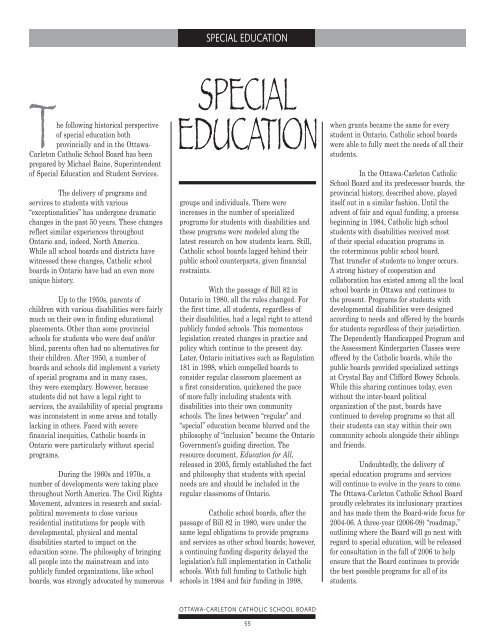Ottawa - Ottawa Catholic School Board
Ottawa - Ottawa Catholic School Board
Ottawa - Ottawa Catholic School Board
You also want an ePaper? Increase the reach of your titles
YUMPU automatically turns print PDFs into web optimized ePapers that Google loves.
The following historical perspective<br />
of special education both<br />
provincially and in the <strong>Ottawa</strong>-<br />
Carleton <strong>Catholic</strong> <strong>School</strong> <strong>Board</strong> has been<br />
prepared by Michael Baine, Superintendent<br />
of Special Education and Student Services.<br />
The delivery of programs and<br />
services to students with various<br />
“exceptionalities” has undergone dramatic<br />
changes in the past 50 years. These changes<br />
reflect similar experiences throughout<br />
Ontario and, indeed, North America.<br />
While all school boards and districts have<br />
witnessed these changes, <strong>Catholic</strong> school<br />
boards in Ontario have had an even more<br />
unique history.<br />
Up to the 1950s, parents of<br />
children with various disabilities were fairly<br />
much on their own in finding educational<br />
placements. Other than some provincial<br />
schools for students who were deaf and/or<br />
blind, parents often had no alternatives for<br />
their children. After 1950, a number of<br />
boards and schools did implement a variety<br />
of special programs and in many cases,<br />
they were exemplary. However, because<br />
students did not have a legal right to<br />
services, the availability of special programs<br />
was inconsistent in some areas and totally<br />
lacking in others. Faced with severe<br />
financial inequities, <strong>Catholic</strong> boards in<br />
Ontario were particularly without special<br />
programs.<br />
During the 1960s and 1970s, a<br />
number of developments were taking place<br />
throughout North America. The Civil Rights<br />
Movement, advances in research and socialpolitical<br />
movements to close various<br />
residential institutions for people with<br />
developmental, physical and mental<br />
disabilities started to impact on the<br />
education scene. The philosophy of bringing<br />
all people into the mainstream and into<br />
publicly funded organizations, like school<br />
boards, was strongly advocated by numerous<br />
SPECIAL EDUCATION<br />
SPECIAL<br />
EDUCATION<br />
groups and individuals. There were<br />
increases in the number of specialized<br />
programs for students with disabilities and<br />
these programs were modeled along the<br />
latest research on how students learn. Still,<br />
<strong>Catholic</strong> school boards lagged behind their<br />
public school counterparts, given financial<br />
restraints.<br />
With the passage of Bill 82 in<br />
Ontario in 1980, all the rules changed. For<br />
the first time, all students, regardless of<br />
their disabilities, had a legal right to attend<br />
publicly funded schools. This momentous<br />
legislation created changes in practice and<br />
policy which continue to the present day.<br />
Later, Ontario initiatives such as Regulation<br />
181 in 1998, which compelled boards to<br />
consider regular classroom placement as<br />
a first consideration, quickened the pace<br />
of more fully including students with<br />
disabilities into their own community<br />
schools. The lines between “regular” and<br />
“special” education became blurred and the<br />
philosophy of “inclusion” became the Ontario<br />
Government’s guiding direction. The<br />
resource document, Education for All,<br />
released in 2005, firmly established the fact<br />
and philosophy that students with special<br />
needs are and should be included in the<br />
regular classrooms of Ontario.<br />
<strong>Catholic</strong> school boards, after the<br />
passage of Bill 82 in 1980, were under the<br />
same legal obligations to provide programs<br />
and services as other school boards; however,<br />
a continuing funding disparity delayed the<br />
legislation’s full implementation in <strong>Catholic</strong><br />
schools. With full funding to <strong>Catholic</strong> high<br />
schools in 1984 and fair funding in 1998,<br />
OTTAWA-CARLETON CATHOLIC SCHOOL BOARD<br />
55<br />
when grants became the same for every<br />
student in Ontario, <strong>Catholic</strong> school boards<br />
were able to fully meet the needs of all their<br />
students.<br />
In the <strong>Ottawa</strong>-Carleton <strong>Catholic</strong><br />
<strong>School</strong> <strong>Board</strong> and its predecessor boards, the<br />
provincial history, described above, played<br />
itself out in a similar fashion. Until the<br />
advent of fair and equal funding, a process<br />
beginning in 1984, <strong>Catholic</strong> high school<br />
students with disabilities received most<br />
of their special education programs in<br />
the coterminous public school board.<br />
That transfer of students no longer occurs.<br />
A strong history of cooperation and<br />
collaboration has existed among all the local<br />
school boards in <strong>Ottawa</strong> and continues to<br />
the present. Programs for students with<br />
developmental disabilities were designed<br />
according to needs and offered by the boards<br />
for students regardless of their jurisdiction.<br />
The Dependently Handicapped Program and<br />
the Assessment Kindergarten Classes were<br />
offered by the <strong>Catholic</strong> boards, while the<br />
public boards provided specialized settings<br />
at Crystal Bay and Clifford Bowey <strong>School</strong>s.<br />
While this sharing continues today, even<br />
without the inter-board political<br />
organization of the past, boards have<br />
continued to develop programs so that all<br />
their students can stay within their own<br />
community schools alongside their siblings<br />
and friends.<br />
Undoubtedly, the delivery of<br />
special education programs and services<br />
will continue to evolve in the years to come.<br />
The <strong>Ottawa</strong>-Carleton <strong>Catholic</strong> <strong>School</strong> <strong>Board</strong><br />
proudly celebrates its inclusionary practices<br />
and has made them the <strong>Board</strong>-wide focus for<br />
2004-06. A three-year (2006-09) “roadmap,”<br />
outlining where the <strong>Board</strong> will go next with<br />
regard to special education, will be released<br />
for consultation in the fall of 2006 to help<br />
ensure that the <strong>Board</strong> continues to provide<br />
the best possible programs for all of its<br />
students.


